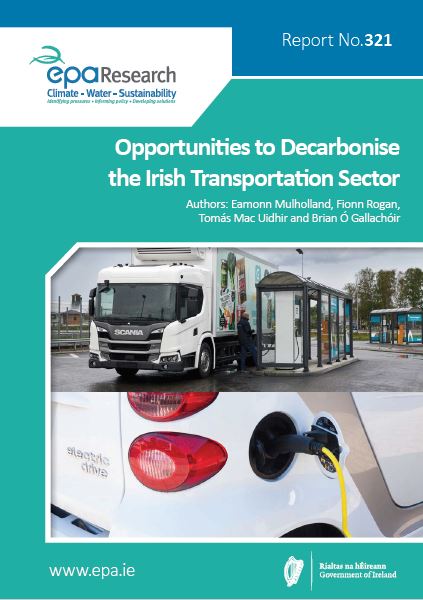Research 321: Opportunities to Decarbonise the Irish Transport Sector
Authors: Eamonn Mulholland, Fionn Rogan, Tomás Mac Uidhir and Brian Ó Gallachóir
Summary: In 2017, the energy sector was responsible for 60% of Ireland’s greenhouse gas (GHG) emissions. The largest contributor to Ireland’s energy-related GHG emissions, at 33%, is the transport sector. A range of technoeconomic and socioeconomic analytical tools and models were developed and employed in this project to generate an evidence base that can inform decarbonisation focused transport sector decision-taking and policymaking.

Identifying Pressures
The energy sector is responsible for 60% of Ireland’s greenhouse gas (GHG) emissions. The largest contributor to Ireland’s energy-related GHG emissions is the transport sector. Ireland faces mandatory targets for GHG emissions reductions in the sectors that are outside the European Union Emissions Trading System (ETS) for the periods 2013–2020 and 2021–2030. Private cars account for more than one-quarter of all energy-related non-ETS GHG emissions. The share of transport-related energy demand and, consequentially, GHG emissions have increased consistently in the past 5 years. The continued rise in transport activity, energy consumption and emissions can be attributed to economic, technological and societal factors. Therefore, a range of technoeconomic and socioeconomic analytical tools and models was developed and employed in this project to generate an evidence base that can inform decarbonisation-focused transport sector decision-taking and policymaking. This report describes the findings from these tools and models, outlining some of the options for long-term decarbonisation in the Irish transport sector, with a focus on private cars, light commercial vehicles and heavy duty vehicles (which together comprise 93% of final energy consumption in the transport sector).
Informing Policy
The results of the research point to a series of policy recommendations. For private cars, the increased use of biofuels will be the main contributor to meeting Ireland’s mandatory 2020 renewable energy in transport target of 10%. In the medium term (to 2030), Irish policy measures that incentivise the purchase of more efficient vehicles through varying tax rates should continue to be part of a portfolio of measures. In the longer term (to 2050), a key recommendation is incentivising the switch to electric vehicles. For light goods vehicles, the results point to a change in the taxation bands from the current unladen weight bands to specific carbon emissions bands. In the medium to long term, banning the sale of diesel light commercial vehicles in 2030 and encouraging the sale of biomethane-fuelled light commercial vehicles would result in a 99.6% reduction in light commercial vehicle emissions by 2050 relative to a baseline scenario (i.e. a scenario without long- erm emissions reduction targets). For heavy goods vehicles, the results indicate that optimised routing, platooning, improving vehicle utilisation, back-hauling and co-loading have the potential to reduce activity by up to 36% by 2050. Adopting energy-efficient truck technologies is another key policy option with significant potential (nearly 20% GHG emissions reduction by 2050 relative to the aforementioned baseline scenario). Promoting the deployment of alternative fuels (in particular, advanced biofuels but also some electrification potential) and the trucks that use them is the final policy recommendation.
Developing Solutions
In the short term, a biofuel obligation of approximately 13% is required to achieve the 2020 10% renewable energy share in transport (RES-T) target because of differences in energy content. Moving beyond 2020, higher levels of blending can be achieved using advanced biofuels, such as hydrotreated vegetable oil (HVO, also known as renewable diesel). The first commercial production globally of HVO was in the Whitegate Oil Refinery in Cork Harbour. In the medium to long term, the results of this research point to a shift to electric vehicles for car transport, with a number of options for light and heavy goods vehicles, with a greater focus on liquid and gaseous fuels. Imposing a ban on the sale of fossil fuel-powered vehicles, increasing the variety of available electric vehicle models and improving the public charging network are projected to contribute to a well-to-wheel emissions reduction of 56% and a reduction in final energy consumption of 48% by 2050 relative to a baseline. Promotion of conventional and advanced biofuels (biodiesel, HVO and biomethane) for deployment in the heavy duty vehicle fleet has the greatest potential reduction contribution of all measures, at 24% by 2050 relative to a baseline.
https://www.epa.ie/media/epa-2020/publications/research/Research-321-thumbnail.JPG